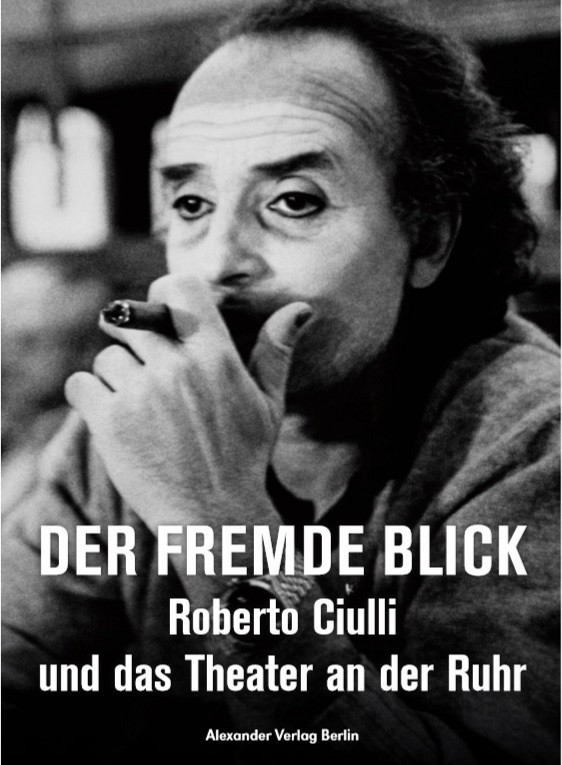Der Fremde Blick
Book presentation with Roberto Ciulli

Roberto Ciulli and Navid Kermani at the Berlin Academy of Arts.
Recording from 07.11.2021
Excerpts from the review of the book launch in: Süddeutsche Zeitung, 11/16/2021
So much life, so much plump life
Last Sunday, the 87-year-old theater director Roberto Ciulli was a guest at the Akademie der Künste in Berlin. He presented, together with the writer Navid Kermani, his book. "Book" is an understatement in this case. It is two enormous books: on almost 1300 pages there are not simply memories of a young old man. One leafs through a wild, fantastic, philosophical work, rich in thought and imagery, bursting with life. It is called: "Der fremde Blick - Roberto Ciulli und das Theater an der Ruhr".
Excerpts from the review of the book in Die Deutsche Bühne:
"l) The idea of founding an autonomous theater stems from the desire to gain singular conditions for artistic work. The prevailing structures of municipal theaters today allow the necessary effort to develop theater as an art form to lapse into mostly impotent attempts directed against the technical and administrative apparatus." (from: "Der fremde Blick - Roberto Ciulli und das Theater an der Rühr", page 354)
Roberto Ciulli and his dramaturge and decades-long working partner Helmut Schäfer thus began their "working blueprint for an autonomous theater" in 1979. The attitude behind this was not new at the time and is still occasionally advocated today. However, the fact that such considerations actually contributed to the founding of a theater that has existed for almost 40 years today may be considered singular, just like the economic and production conditions: the city of Mülheim an der Ruhr provided Roberto Ciulli with 200,000 DM annually starting in 1981. In return, he had to offer 150 performances per season with the new Theater an der Ruhr and finance his 20-man team. Of course, this could not be achieved in Mülheim alone. Each of the two productions was shown seven times per season in the Stadthalle. So the theater toured, to Remscheid or Ludwigshafen, soon also to Iran or Ecuador, in the course of its history to no less than 42 countries - and not only with the idea of operational self-preservation through artistic work, but with independent, quite extreme (and influenced by the production conditions) aesthetic ideas. [...]
Success Story
The double volume edited by Alexander Wewerka and Jonas Tinius, "Der fremde Blick" , thankfully does not approach this unique success story with a grand master's eulogy with lavish introspections, which, as is well known, is often published at the end of successful directorships, but in the form of an accompanied, annotated documentation. Since he is the central figure, Roberto Ciulli is given the opportunity to express himself in a variety of ways. In pictorial and written testimonies, his biography is documented as thoroughly and extensively in the first, red volume as the history and artistic output of the Theater an der Ruhr is in the second, blue volume. This ranges, imaginatively and reader-friendly arranged, from children's and family pictures to facsimile contracts to staging photos, from novel fragments to interviews to conceptual and philosophical texts. In addition, there are raving reviews as well as critiques by journalists sympathetic to the theater and the theater-maker, such as Benjamin Henrichs, Heinz Klunker, and Reinhard Kill. Kill, in particular, repeatedly finds beautiful, apt phrases in the Rheinische Post for Ciulli's in many respects indeed "alien view" of theater. "He does not pretend to know", he says about "A Midsummer Night's Dream" and about "The Bacchae": Ciulli's theater "is by no means only looking for meaning, it is also appearance, unleashes a desire to watch that has become rare on our stages", an observation that could also be applied to the optical preparation of "The Foreign Gaze", which awakens memories, but above all makes curious. [...]
Experience
Dealing with these 1250 pages, leafing through them and reading them, has an experiential character in the narrower sense. Individual sentences or sections seem to constantly detach themselves from the text, to entemalize one's consciousness as a word turned into a hook. Example pleasing? "Only then is it culture, when it has become yours", "Theater is a discourse that goes on for a lifetime", .directing is the art of enabling chance" or "I no longer have my own language". Someone knows what he is talking about and dares to say it without wanting to make himself big or small. And it is noticeable that he is still fighting: for education, for the recognition of the preciousness of knowledge, for the freedom of art and the responsibility of the artist. [...]
Those who read "Der fremde Blick" and did not know all this before, will possibly awaken the desire in themselves to travel to Mülheim an der Ruhr some day.
Information
Location
Theater an der Ruhr
Akazienallee 61
45478 Theater an der Ruhr